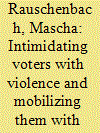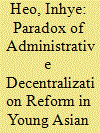| Srl | Item |
| 1 |
ID:
167290


|
|
|
|
|
| Summary/Abstract |
Recent research suggests that intimidating voters and electoral clientelism are two strategies on the menu of manipulation, often used in conjunction. We do not know much, however, about who is targeted with which of these illicit electoral strategies. This article devises and tests a theoretical argument on the targeting of clientelism and intimidation across different voters. We argue that in contexts where violence can be used to influence elections, parties may choose to demobilize swing and opposition voters, which frees up resources to mobilize their likely supporters with clientelism. While past research on this subject has either been purely theoretical or confined to single country studies, we offer a first systematic cross-national and multilevel analysis of clientelism and voter intimidation in seven African countries. We analyze which voters most fear being intimidated with violence and which get targeted with clientelistic benefits, combining new regional-level election data with Afrobarometer survey data. In a multilevel analysis, we model the likelihood of voters being targeted with either strategy as a function of both past election results of the region they live in and their partisan status. We find that voters living in incumbent strongholds are most likely to report having being bribed in elections, whereas those living in opposition strongholds are most fearful of violent intimidation. We further provide suggestive evidence of a difference between incumbent supporters and other voters. We find support that incumbent supporters are more likely to report being targeted with clientelism, and mixed support for the idea that they are less fearful of intimidation. Our findings allow us to define potential hot spots of intimidation. They also provide an explanation for why parties in young democracies concentrate more positive inducements on their own supporters than the swing voter model of campaigning would lead us to expect.
|
|
|
|
|
|
|
|
|
|
|
|
|
|
|
|
| 2 |
ID:
163915


|
|
|
|
|
| Summary/Abstract |
It is generally perceived that administrative decentralization reform in young democracies is a promise to improve democracy from below. Yet, in terms of democratic development, the impact of this process is ambivalent, and can be described as a paradox of reform. This article argues that preemptive countermeasures that offset problems predicted to emerge as the reform proceeds should be formulated as part of the reform through introducing a preventive policy paradigm in the area of democratic reform policy. This is to alleviate or prevent the creation of the paradox and to contribute to democratic development through enhancing people’s satisfaction with the newly democratized government. To this end, this study examines administrative decentralization reform in South Korea and Indonesia and uncovers these reforms’ paradoxes. These two cases are particularly worthy of study, since their young democratic governments lack countermeasures against predictable reform problems, intensifying the paradox. I argue that the implications drawn from these two cases for methods of enhancing democratic development in other young democracies are worth heeding.
|
|
|
|
|
|
|
|
|
|
|
|
|
|
|
|